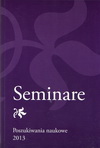Etyczno-antropologiczne aspekty aborcji w świetle wybranych dzieł antycznej literatury Grecji i Rzymu
Ethical and anthropological aspects of abortion in the light of the classical literature of Greece and Rome
Author(s): Tadeusz KołosowskiSubject(s): History
Published by: Towarzystwo Naukowe Franciszka Salezego (TNFS)
Keywords: abortion; antiquity; ancient Greece; ancient Rome; Greek literature; Latin literature
Summary/Abstract: The article presents the view of the ancient Greeks and Romans on abortion from the ethical and anthropological point of view. The author analyses selected literary works of ancient Greek and Roman authors. The analysis leads to several conclusions. In ancient Greece and Rome children were considered a divine blessing and a treasure, while sterility was regarded as a misfortune and a divine punishment, but the killing of children in their mothers’ wombs was practiced, and even born children were put to death for eugenic reasons. This view was represented by Plato and Aristotle, despite their notion that the fetus was animated as early as the mother’s womb. The Stoics who claimed that the fetus was merely a part of the mother did not see any problem with abortion at every stage of pregnancy. Thus, abortion was practiced, but it also drew condemnation from society. It was perceived as a crime deserving of divine and human punishment, as testified by the works of Aeschylus, Cicero, Ovid, and Juvenal.
Journal: Seminare. Poszukiwania naukowe
- Issue Year: 33/2013
- Issue No: 1
- Page Range: 251-262
- Page Count: 12
- Language: Polish

